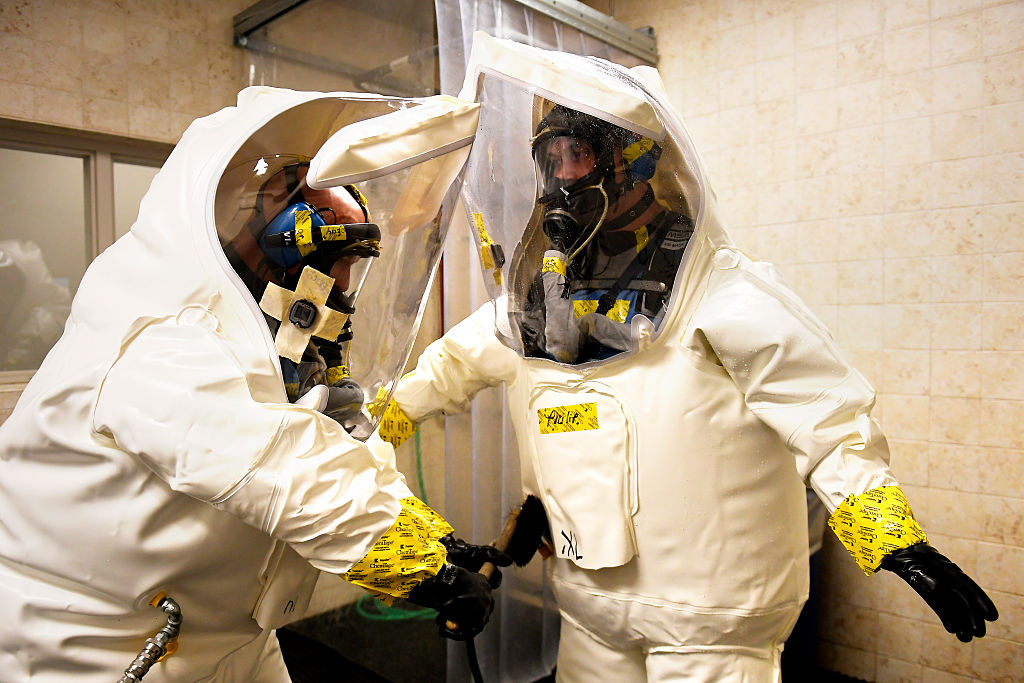The US will soon finish destroying its last chemical weapons


A free daily email with the biggest news stories of the day – and the best features from TheWeek.com
You are now subscribed
Your newsletter sign-up was successful
As soon as June 7, the U.S. is slated to reach a milestone "in the history of warfare dating back to World War I," The Associated Press reported: the destruction of its last chemical weapons.
The country has been working for decades to "eliminate a stockpile that by the end of the Cold War totaled more than 30,000 tons," and is currently racing against a Sept. 30 deadline implemented by the international Chemical Weapons Convention. The remaining munitions include the last of the 51,000 GB nerve agent-filled rockets that have been stored at Kentucky's Blue Grass Army Depot since 1940, per the AP.
"One thing that we're really proud of is how we're finishing the mission. We're finishing it for good for the United States of America," Kim Jackson, manager of another destruction plant in Colorado, told the AP. Workers at that plant finished eliminating a "cache of about 2,600 tons of mustard blister agent" on June 22.
The Week
Escape your echo chamber. Get the facts behind the news, plus analysis from multiple perspectives.

Sign up for The Week's Free Newsletters
From our morning news briefing to a weekly Good News Newsletter, get the best of The Week delivered directly to your inbox.
From our morning news briefing to a weekly Good News Newsletter, get the best of The Week delivered directly to your inbox.
In Kentucky, staffers used a process called neutralization to "dilute the deadly agents so they can be safely disposed of." At the Colorado site, they used robotic equipment to disassemble the weapon and neutralize the mustard agent. Both plants were "the last among several," including in Utah, Alabama, Oregon, Arkansas, and the Johnston Atoll.
What this shows is that "countries can really ban a weapon of mass destruction," Paul Walker, vice chairman of the Arms Control Association and coordinator of the Chemical Weapons Convention Coalition, told the AP. "If they want to do it, it just takes the political will and it takes a good verification system."
Still, it's not easy. At this point, the effort is wrapping up "decades behind schedule" and "2,900% over budget," The New York Times reported. It took so long in part to ensure surrounding communities weren't harmed in the process.
A free daily email with the biggest news stories of the day – and the best features from TheWeek.com
Brigid Kennedy worked at The Week from 2021 to 2023 as a staff writer, junior editor and then story editor, with an interest in U.S. politics, the economy and the music industry.
-
 The ‘ravenous’ demand for Cornish minerals
The ‘ravenous’ demand for Cornish mineralsUnder the Radar Growing need for critical minerals to power tech has intensified ‘appetite’ for lithium, which could be a ‘huge boon’ for local economy
-
 Why are election experts taking Trump’s midterm threats seriously?
Why are election experts taking Trump’s midterm threats seriously?IN THE SPOTLIGHT As the president muses about polling place deployments and a centralized electoral system aimed at one-party control, lawmakers are taking this administration at its word
-
 ‘Restaurateurs have become millionaires’
‘Restaurateurs have become millionaires’Instant Opinion Opinion, comment and editorials of the day
-
 British warship repels 'largest Houthi attack to date' in the Red Sea
British warship repels 'largest Houthi attack to date' in the Red SeaSpeed read Western allies warn of military response to Iranian-backed Yemeni rebels if attacks on ships continue
-
 Houthi rebels claim Red Sea ship attacks
Houthi rebels claim Red Sea ship attacksspeed read Iran-backed Yemeni group vows to escalate aggression towards Israel-linked vessels in revenge for Gaza war
-
 Israel plans next phase of Gaza war as first hostages released
Israel plans next phase of Gaza war as first hostages releasedSpeed read After four-day ceasefire 'we will not stop' until destruction of Hamas, says Israel
-
 Mob storms Russian airport 'looking for Jews'
Mob storms Russian airport 'looking for Jews'Speed Read Plane from Israel surrounded by rioters chanting antisemitic slogans after landing in Russia's Dagestan region
-
 Tuberville's military promotions block is upending lives, combat readiness, 3 military branch chiefs say
Tuberville's military promotions block is upending lives, combat readiness, 3 military branch chiefs saySpeed Read
-
 Ukraine's counteroffensive is making incremental gains. Does it matter in the broader war?
Ukraine's counteroffensive is making incremental gains. Does it matter in the broader war?Speed Read
-
 US commissions first-ever Navy ship in a foreign port
US commissions first-ever Navy ship in a foreign portSpeed Read
-
 British spy chief, Wagner video suggest Prigozhin is alive and freely 'floating around'
British spy chief, Wagner video suggest Prigozhin is alive and freely 'floating around'Speed Read
